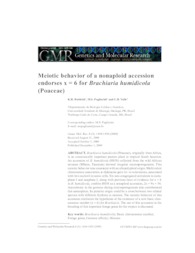Meiotic behavior of a nonaploid accession endorses x = 6 for Brachiaria humidicola (Poaceae).
Meiotic behavior of a nonaploid accession endorses x = 6 for Brachiaria humidicola (Poaceae).
Author(s): BOLDRINI, K. R.; PAGLIARINI, M. S.; VALLE, C. B. do
Summary: Brachiaria humidicola (Poaceae), originally from Africa, is an economically important pasture plant in tropical South America. An accession of B. humidicola (H038) collected from the wild African savanna (Mbeya, Tanzania) showed irregular microsporogenesis. This meiotic behavior was consistent with an allopolyploid origin. Multivalent chromosome association at diakinesis gave tri- to octavalents, associated with two nucleoli in some cells. Six non-congregated univalents in metaphase I and anaphase I, along with previous lines of evidence for x = 6 in B. humidicola, confirm H038 as a nonaploid accession, 2n = 9x = 54. Asynchrony in the genome during microsporogenesis also corroborated this assumption. Its putative origin could be a cross between two related species with different rhythms in meiosis. The meiotic behavior of this accession reinforces the hypothesis of the existence of a new basic chromosome number (x = 6) for Brachiaria. The use of this accession in the breeding of this important forage grass for the tropics is discussed.
Publication year: 2009
Types of publication: Journal article
Unit: Embrapa Beef Cattle
Observation
Some of Embrapa's publications are published as ePub files. To read them, use or download one of the following free software options to your computer or mobile device. Android: Google Play Books; IOS: iBooks; Windows and Linux: Calibre.
Access other publications
Access the Agricultural Research Database (BDPA) to consult Embrapa's full library collection and records.
Visit Embrapa Bookstore to purchase books and other publications sold by Embrapa.

